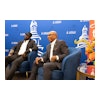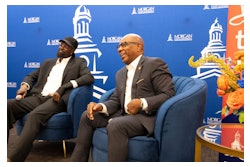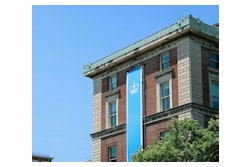The Sage In his own Words
Dr. John Hope Franklin is without question a giant among historians. His outstanding record of research and scholarship has won the admiration of U.S. presidents, fellow educators and scholars from around the globe. This gentleman/scholar is still turning out award-winning books even as an octogenarian. BI Senior Writer Joan Morgan spoke with him at Duke University recently about the new center, the influence of his parents and the writing of his upcoming autobiography.
Morgan: When did you find out about plans to build a center at Duke University in your honor and what was your reaction?
Franklin: Various people had told me about it. Then the president (Dr. Nan Keohane) sent for me and said, “I know you know what I want to tell you about because it’s in the streets.” And she wanted to know if I would grant permission for my name to be used in the center. I told her I was deeply moved, honored and pleased. This project is so exciting. As you know, they are seeking to carry on and replicate the things I’ve been interested in all my life — the various facets of international education, interdisciplinary education and of course, ethnic and race problems.
Morgan: I think more people may be familiar with your writings on ethnic and race problems than on those writings and works in interdisciplinary and international studies. Can you tell us more about the work you’ve done in those areas?
Franklin: I have tried, even as I worked in history of the South and African American history, to cut across disciplines. I think the story, and the problems are not confined to any one area. The economic problems, political problems, social problems and religious problems, almost any aspect of the area you want to focus on is in turn a part of the intellectual problems pursued. So that it was very important to me to make certain that my approach to any problem is a broad approach and encompasses many facets of the problem. You can’t just focus on, say, the politics of race for you have at the same time the economics of race and they impinge on each other. Indeed they tend to affect each other. That is why you have to study them and get some understanding of the way in which the problem flows, which direction it’s going and whether it’s being ameliorated or solved, or regressed. It’s important to see these things.
I began to travel abroad almost 50 years ago. I first went to the Center of American Studies at Salzburg, Austria, right after the war [World War II]. I ran into Europeans of all complexions and kinds. There were even Germans there, despite the fact that they had been so recently in the “dog house” as it were. There were Yugoslavs, French, English, Scotch and Scandinavians and I saw that the problems they confronted were problems which had something in common with the problems which we confront in this country. I remember the first time I was in England. I saw the race problem rearing its head. And I went back many times after that in the 50s and 60s and it was still with them and they were curious about ours.
When I went to Africa, I saw the heavy hand of colonialism and imperialism and it was reminiscent of what we have in this country. I went to Australia and there I saw an entirely different situation. People were talking about the White Australian policy and of course, I thought of the Black/White paradigm. But what they really meant was the White Australian policy as it applied to Asians — the Japanese, Chinese and people of the islands.
Morgan: You’ve spoken before about the influence of your father on your life. Tell me about that.
Franklin: Let’s speak first of my mother. When I was 6 years old, my father left the village in which we were living. The village was Rentiesville, Okla. It was an all-Black town and it just didn’t provide a viable living for him as a lawyer. My mother was teaching school, but that wasn’t income enough for four growing children, two of whom were away at boarding school. My sister and I were at home. So my father went to Tulsa in February of 1921 to make a life for us there. And he was doing very well, and we were to go at the end of the school year, when my mother’s school would be out in late May and we would be out of school. I was in the first grade. And then we would all go to Tulsa in June of 1921.
Then the race riot occurred in Tulsa. My father was burned out. Everything was leveled to the ground, everything but what he had on his back. He had to start over again… for the next four years we had to stay in Rentiesville, unpack and start over again. Those were very formative years in which my mother was both my father and mother. He [my father] would come home once every six or eight weeks, but handling a growing six, seven, eight, nine, 10-year-old was her responsibility and so many of my habits and standards and ideals and way of thinking and so forth were shaped by her during that period.
We didn’t go to Tulsa until 1925, four years after the riots. Then my father began to have a really profound influence on me….
Once when I was 11, he was scheduled to give the keynote speech for the emancipation day celebration on the first of January 1926. He had to go out of town so he asked me to do it. And I did it. He wrote the speech and sent word to those people that he was sorry he had to leave town and that I would deliver his speech. And I delivered it to a full audience who gave me a standing ovation. I can remember that.
I’m just saying that to say that he had that much confidence in me. I never saw my father at night when he wasn’t reading or writing. And I thought that was what you were supposed to do at night, read or write. And that’s what I still do.
Morgan: So, what’s next for you? I recall you talking about doing an autobiography.
Franklin: I’m working on an autobiography now. This involves trying to recreate my life as I remember it and as the documents inform me. I’m not a good archivist. I don’t keep records too well. I’ve never kept a journal. Can you imagine how difficult it was to recreate my boyhood with both my parents deceased and all of my sibling’s deceased and most of my playmates and schoolmates deceased? I had to rely on the published schedules and descriptions of the village where I lived, and of course, when I got to Tulsa and began to go to school there, the records become a little more available. Some of the larger things I can get from the newspapers. But it was not really until I got out and had a career that the record will bear me up and inform me. By the time I got out of Harvard and got into teaching and into publishing, the records will take over, the printed or public record will take over and the private record will take over. I have been able to find, because I’m younger than a lot of my colleagues in the field of history, and their papers are now becoming available, and I can go to those papers and find out what they thought of me. I’ll be telling all of that in my autobiography.
Morgan So how will you personally use the center? I understand that you are going to have an office there.
Franklin: Well that’s an embarrassing question because I don’t see myself using the center office very much. They have been very gracious and generous in providing an office for me, but I’m going to have to be working at home. When my wife became ill, I moved my office from Duke to my house and I’ve set up here in a way that would take me months to reestablish myself there. Then I’m going to be going to the Library of Congress sometime this spring, and I’ll be there for several months. And those are months that I won’t be using my office. When I finish the autobiography, I’ll be glad to go there with some regularity because I don’t plan to do any more serious writing, certainly not a book. I’m not going to write any more books after this one. I might write some essays.
Morgan: You have received many honors and different kinds of recognition in your life; how does the center being named for you stack up against those?
Franklin: Well, it ranks at the very top. There aren’t many experiences or indications of esteem or recognition that would get beyond that. I guess the honorary degrees are what they are and there are many of them. I cherish every one of them, more than 130. The Presidential Medal of Freedom is wonderful. And I couldn’t begin to name the recognitions and all of the things. But to name a program for me, a very enlightened, visionary program that will bring together scholars from all over the world that will attempt to focus on some of the great problems of our time in an effort to solve them … recognizing the global nature of some of them, recognizing the significance of them for the future, and to tie my name to this effort is something that I’m not sure that I deserve. But I hope to be worthy of it.
© Copyright 2005 by DiverseEducation.com


















